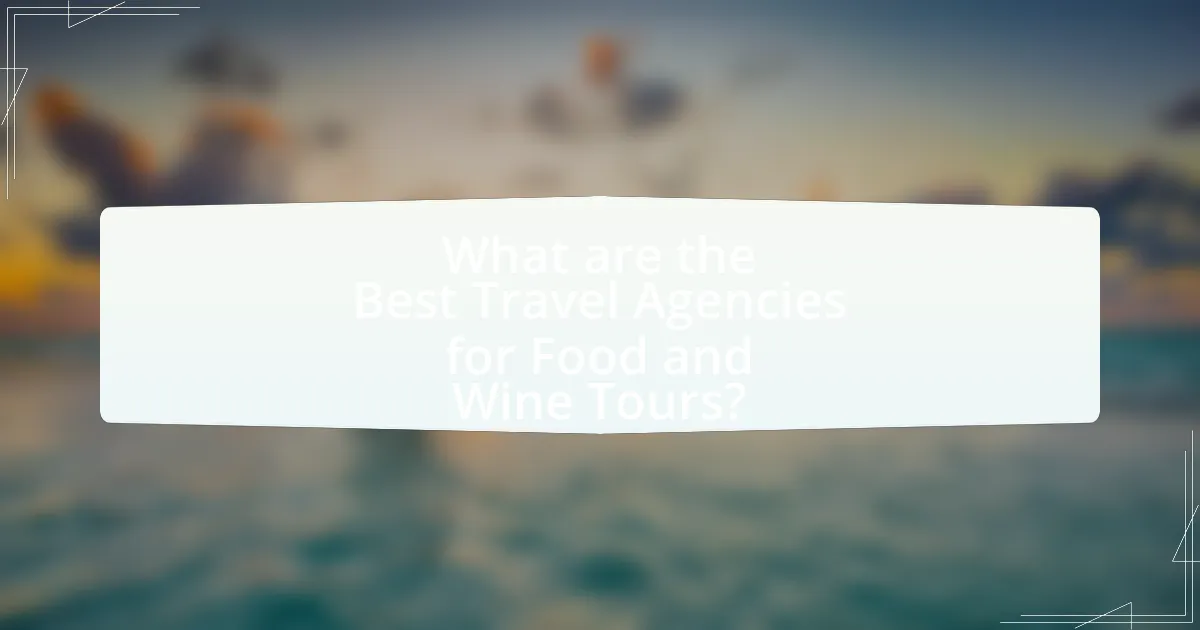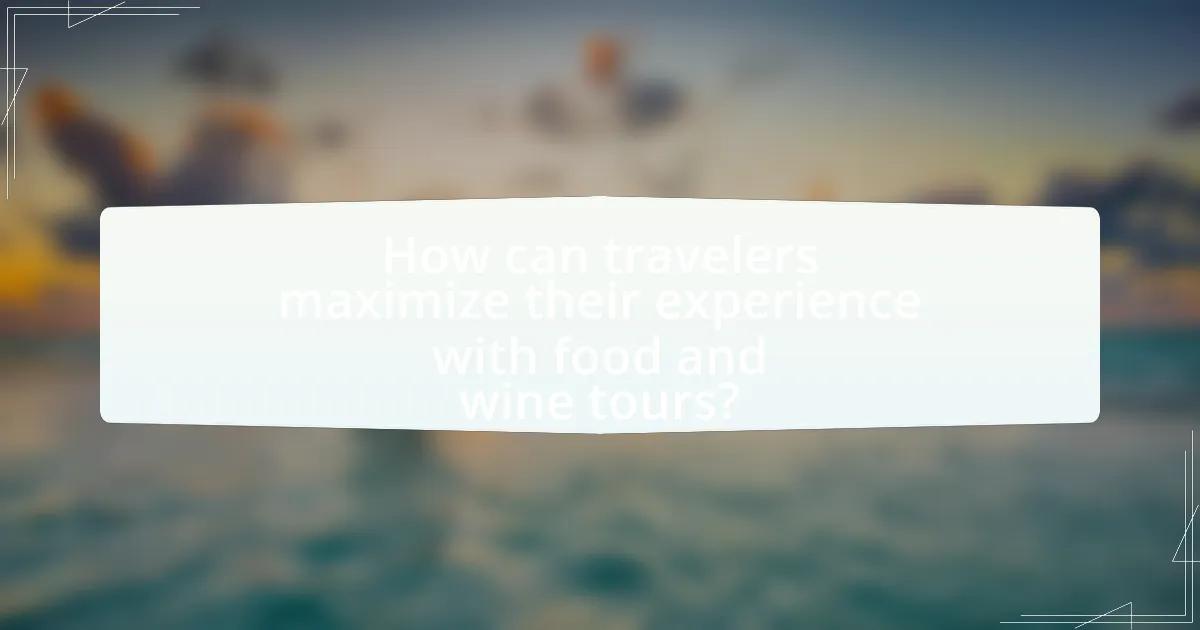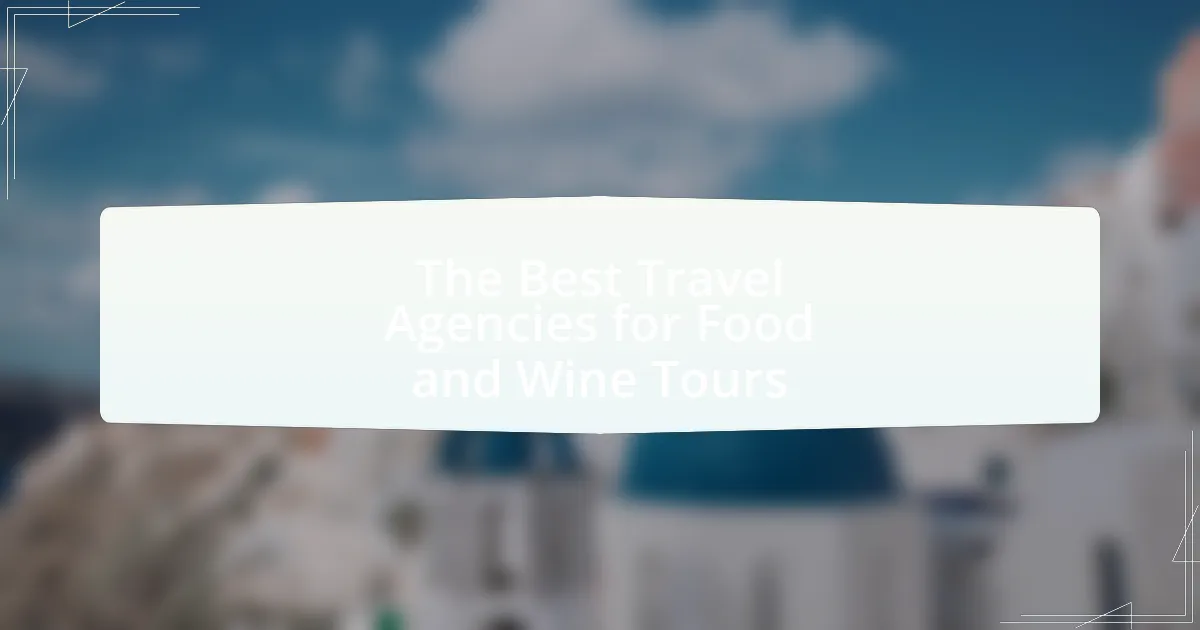The article focuses on the best travel agencies for food and wine tours, highlighting Culinary Tours, Food & Wine Trails, and Viator as top choices. It details how these agencies specialize in creating immersive culinary experiences, offering personalized itineraries that include vineyard visits, cooking classes, and exclusive tastings. The article also discusses the importance of customer feedback in selecting a travel agency, the unique offerings available for food and wine enthusiasts, and tips for maximizing the experience during these tours. Additionally, it outlines criteria for evaluating agencies and common pitfalls to avoid when booking a tour.

What are the Best Travel Agencies for Food and Wine Tours?
The best travel agencies for food and wine tours include Culinary Tours, Food & Wine Trails, and Viator. Culinary Tours specializes in immersive culinary experiences across various regions, offering personalized itineraries that highlight local cuisine and wine. Food & Wine Trails provides curated tours focusing on wine regions, featuring tastings and vineyard visits, with a strong reputation for quality and customer satisfaction. Viator, a well-known travel platform, offers a wide range of food and wine tours globally, allowing travelers to choose from numerous options based on their preferences and locations. These agencies are recognized for their expertise in creating memorable gastronomic experiences, supported by positive customer reviews and industry accolades.
How do these travel agencies specialize in food and wine experiences?
Travel agencies specializing in food and wine experiences curate unique itineraries that focus on culinary traditions and local wine production. These agencies often collaborate with local chefs, wineries, and food artisans to provide authentic experiences such as cooking classes, vineyard tours, and tastings. For instance, agencies may offer exclusive access to renowned restaurants or private wine cellars, enhancing the travel experience with personalized service and expert guidance. This specialization is supported by the growing demand for gastronomic tourism, which has seen a significant increase, with reports indicating that food and wine experiences are among the top reasons travelers choose specific destinations.
What unique offerings do these agencies provide for food and wine enthusiasts?
Travel agencies specializing in food and wine tours offer unique experiences such as curated tastings, exclusive access to vineyards, and culinary workshops led by renowned chefs. These agencies often provide personalized itineraries that include behind-the-scenes tours of wineries, opportunities to meet local producers, and immersive cooking classes that highlight regional cuisines. For instance, some agencies partner with Michelin-starred restaurants to arrange private dining experiences, enhancing the gastronomic journey for enthusiasts.
How do these agencies curate their food and wine tours?
Agencies curate their food and wine tours by conducting thorough research on local culinary traditions, sourcing high-quality ingredients, and partnering with reputable chefs and wineries. They often evaluate customer preferences and feedback to tailor experiences that highlight regional specialties. For instance, agencies may include exclusive tastings at renowned vineyards or cooking classes with local chefs, ensuring an authentic experience. This approach is supported by industry trends indicating that personalized and immersive experiences significantly enhance customer satisfaction in food and wine tourism.
Why should travelers consider food and wine tours?
Travelers should consider food and wine tours because they offer immersive experiences that combine culinary exploration with cultural insights. These tours allow participants to taste local dishes and wines, enhancing their understanding of regional traditions and ingredients. For instance, a study by the International Culinary Tourism Association found that 80% of travelers prioritize food experiences when choosing a destination, highlighting the significance of gastronomy in travel. Additionally, food and wine tours often include visits to local markets, vineyards, and restaurants, providing a comprehensive view of the local food scene and fostering connections with local chefs and producers.
What are the benefits of participating in food and wine tours?
Participating in food and wine tours offers several benefits, including the opportunity to experience local culture, enhance culinary knowledge, and enjoy unique tastings. These tours often provide guided experiences that connect participants with local chefs, winemakers, and artisans, allowing for an authentic understanding of regional cuisines and wine production. Additionally, food and wine tours can lead to discovering hidden gems in the culinary scene that may not be accessible to the average traveler. According to a study by the Culinary Tourism Alliance, 70% of travelers express interest in food-related experiences, highlighting the growing demand for such tours.
How do food and wine tours enhance cultural experiences?
Food and wine tours enhance cultural experiences by providing immersive interactions with local culinary traditions and practices. These tours allow participants to engage directly with local producers, chefs, and artisans, fostering a deeper understanding of regional ingredients, cooking techniques, and historical contexts. For instance, a study by the International Journal of Tourism Research highlights that food tourism significantly contributes to cultural appreciation and community engagement, as travelers learn about the cultural significance of local dishes and beverages. This direct engagement not only enriches the travel experience but also promotes cultural preservation and appreciation among visitors.

What criteria should be used to evaluate travel agencies for food and wine tours?
To evaluate travel agencies for food and wine tours, consider criteria such as expertise in culinary experiences, customer reviews, partnerships with local producers, and the variety of tour options offered. Expertise in culinary experiences ensures that the agency has knowledgeable guides who can provide insights into local cuisine and wine. Customer reviews, often found on platforms like TripAdvisor, reflect the satisfaction of previous clients and can indicate the quality of the tours. Partnerships with local producers enhance the authenticity of the experience, allowing travelers to engage directly with vineyards and restaurants. Lastly, a diverse range of tour options caters to different preferences and budgets, making the agency more appealing to a wider audience.
How important is customer feedback in choosing a travel agency?
Customer feedback is crucial in choosing a travel agency, as it directly influences potential clients’ perceptions and decisions. Research indicates that 79% of consumers trust online reviews as much as personal recommendations, highlighting the significant impact of customer experiences on agency selection. Positive feedback can enhance an agency’s reputation, while negative reviews can deter clients, making it essential for agencies to actively manage and respond to customer feedback to build trust and credibility in the competitive travel market.
What role do reviews and testimonials play in agency selection?
Reviews and testimonials significantly influence agency selection by providing potential clients with insights into the experiences of previous customers. These evaluations help establish credibility and trust, as 79% of consumers trust online reviews as much as personal recommendations, according to a study by BrightLocal. Positive testimonials can highlight an agency’s strengths, such as exceptional service or unique offerings, while negative reviews can serve as warnings about potential issues. Consequently, reviews and testimonials act as a critical decision-making tool, guiding consumers toward agencies that align with their expectations for food and wine tours.
How can travelers assess the quality of service provided by these agencies?
Travelers can assess the quality of service provided by travel agencies specializing in food and wine tours by examining customer reviews, ratings, and testimonials. These evaluations often reflect the experiences of previous clients, highlighting aspects such as the professionalism of staff, the quality of tours, and the overall satisfaction with the services offered. Additionally, travelers can check industry awards or certifications that agencies may have received, which serve as indicators of their credibility and service excellence. For instance, agencies recognized by organizations like the Travel and Leisure World’s Best Awards often demonstrate a high standard of service based on customer feedback and expert evaluations.
What types of food and wine tours are offered by these agencies?
Agencies offer a variety of food and wine tours, including vineyard tours, culinary classes, gourmet food tastings, and regional cuisine explorations. Vineyard tours typically include guided visits to wineries, wine tastings, and insights into the winemaking process. Culinary classes often feature hands-on cooking experiences with local chefs, focusing on traditional dishes. Gourmet food tastings highlight local delicacies, allowing participants to sample a range of regional specialties. Regional cuisine explorations immerse travelers in the local food culture, often combining visits to markets, restaurants, and food festivals. These offerings cater to diverse preferences, ensuring a comprehensive experience of local gastronomy and viticulture.
What are the most popular destinations for food and wine tours?
The most popular destinations for food and wine tours include regions such as Tuscany in Italy, Bordeaux in France, Napa Valley in California, and the Barossa Valley in Australia. Tuscany is renowned for its picturesque vineyards and traditional Italian cuisine, attracting food and wine enthusiasts. Bordeaux is famous for its prestigious wine estates and gourmet dining experiences, making it a top choice for connoisseurs. Napa Valley offers a diverse range of wineries and culinary experiences, appealing to both casual drinkers and serious wine lovers. The Barossa Valley is celebrated for its rich Shiraz wines and farm-to-table dining, drawing visitors seeking authentic Australian flavors. These destinations consistently rank high due to their unique offerings and cultural significance in the culinary world.
How do different tours cater to various culinary interests?
Different tours cater to various culinary interests by offering specialized experiences that focus on regional cuisines, cooking classes, wine tastings, and food markets. For instance, culinary tours in Italy often emphasize pasta-making workshops and wine pairings, while tours in Japan may include sushi-making classes and visits to local fish markets. These tours are designed to engage participants with hands-on activities and authentic local flavors, ensuring that they can explore diverse culinary traditions. According to a report by the World Food Travel Association, 93% of travelers express interest in food-related experiences, highlighting the demand for tours that cater to specific culinary preferences.

How can travelers maximize their experience with food and wine tours?
Travelers can maximize their experience with food and wine tours by researching and selecting tours that align with their culinary interests and preferences. Engaging with local guides who possess in-depth knowledge about regional cuisine and wine production enhances the experience, as they can provide insights into the cultural significance of the food and wine being sampled. Additionally, participating in hands-on activities, such as cooking classes or vineyard tours, allows travelers to gain a deeper appreciation for the culinary arts. According to a study by the International Culinary Tourism Association, 80% of travelers reported that immersive experiences significantly enriched their travel enjoyment, highlighting the value of active participation in food and wine tours.
What tips should travelers consider before booking a food and wine tour?
Travelers should consider researching the reputation of the tour provider before booking a food and wine tour. A reputable agency often has positive reviews and testimonials, indicating a history of satisfied customers. Additionally, travelers should check the itinerary details to ensure it aligns with their culinary interests, such as specific cuisines or types of wine. Understanding the inclusions, like meals and tastings, is crucial for assessing value. Furthermore, travelers should inquire about group sizes, as smaller groups typically offer a more personalized experience. Lastly, reviewing cancellation policies can provide peace of mind in case plans change.
How can travelers prepare for a food and wine tour to enhance enjoyment?
Travelers can enhance their enjoyment of a food and wine tour by researching the local cuisine and wine regions beforehand. Understanding the specific dishes and wines that will be featured allows travelers to appreciate the cultural context and flavors. Additionally, booking tours with reputable agencies that specialize in food and wine experiences ensures knowledgeable guides and quality tastings. According to a study by the International Culinary Tourism Association, informed travelers report higher satisfaction levels during culinary tours, as they engage more deeply with the food and wine being presented.
What should travelers pack for a food and wine tour?
Travelers should pack comfortable clothing, sturdy walking shoes, a reusable water bottle, a camera, and a notebook for a food and wine tour. Comfortable clothing allows for ease of movement during tastings and tours, while sturdy walking shoes are essential for exploring vineyards and markets. A reusable water bottle helps stay hydrated, and a camera captures memorable experiences. A notebook is useful for jotting down tasting notes and restaurant recommendations. These items enhance the overall experience and ensure travelers are prepared for various activities associated with food and wine tours.
What are common pitfalls to avoid when choosing a travel agency for food and wine tours?
Common pitfalls to avoid when choosing a travel agency for food and wine tours include failing to verify the agency’s expertise in culinary experiences, overlooking customer reviews, and not confirming the quality of included experiences. Agencies lacking specific knowledge in food and wine may not provide authentic or high-quality tours, which can diminish the overall experience. Customer reviews on platforms like TripAdvisor or Yelp can reveal insights into the agency’s reliability and service quality. Additionally, not checking the details of what is included in the tour, such as meal quality and winery selections, can lead to disappointment.
How can travelers identify red flags in travel agency offerings?
Travelers can identify red flags in travel agency offerings by scrutinizing the agency’s credentials, reviews, and pricing structures. Agencies lacking proper accreditation, such as membership in recognized organizations like the American Society of Travel Advisors, may indicate untrustworthiness. Additionally, negative reviews on platforms like TripAdvisor or Google can signal poor service or reliability. Unusually low prices compared to competitors often suggest hidden fees or subpar services, which can lead to disappointing experiences. Therefore, verifying credentials, checking reviews, and comparing prices are essential steps for travelers to ensure they choose a reputable travel agency.
What questions should travelers ask before booking a tour?
Travelers should ask about the itinerary, including specific destinations and activities, before booking a tour. Understanding the details of the itinerary ensures that the tour aligns with the traveler’s interests and expectations. Additionally, travelers should inquire about the group size to gauge the level of personal attention they will receive, as smaller groups often provide a more intimate experience. It’s also essential to ask about the qualifications of the tour guide, as knowledgeable guides can enhance the overall experience by providing insights and context. Furthermore, travelers should confirm what is included in the tour price, such as meals, transportation, and entrance fees, to avoid unexpected costs. Lastly, checking the cancellation policy is crucial, as it provides clarity on the options available should plans change.
What are the best practices for enjoying food and wine tours?
To enjoy food and wine tours effectively, participants should prioritize planning, pacing, and engagement. Planning involves researching the tour itinerary, understanding the types of food and wine being offered, and selecting tours that align with personal preferences. Pacing is crucial; individuals should allow time to savor each tasting and avoid rushing through experiences, as studies show that mindful eating enhances enjoyment and appreciation. Engagement with guides and fellow participants enriches the experience, as sharing insights and asking questions can lead to a deeper understanding of the culinary and viticultural aspects. These practices ensure a more fulfilling and memorable food and wine tour experience.

Leave a Reply